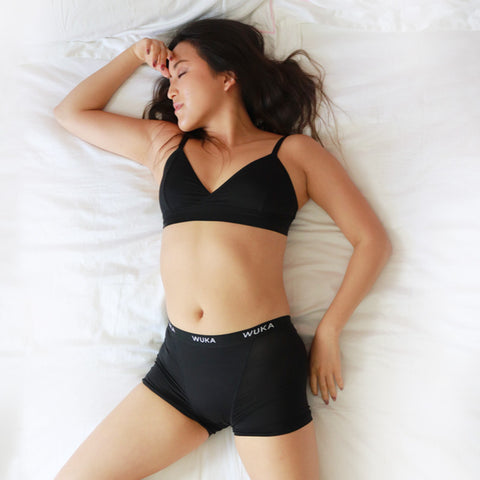
Lots of women struggle to sleep on their period. WUKA experts discuss what causes sleep issues and how sleep is affected by your menstrual cycle.
Your menstrual cycle and sleep
You probably already know the drill. You’ve got your period. You’re tired, crampy and feeling bloated. You’re ready for bed and you want nothing more than to crawl under the duvet and sleep… so why is it that the rest you’ve been dreaming about just doesn’t happen?
According to this study, women in general report poor sleep and are at a high higher risk of insomnia than men. Researchers believe that hormones are to blame, and that the menstrual cycle actually affects our circadian rhythm. The study states that
‘Menstruating women (even without significant menstrual-related complaints) often report poorer sleep quality and greater sleep disturbance during the premenstrual week compared to other times of her menstrual cycle.’
The study concludes that hormones and physiological changes that take place during menstruation, pregnancy and menopause can have an impact on sleep, and this can in turn impact on our daily lives too. It also reports that women who experience PMS symptoms are more likely to suffer with sleep disturbances- backed up by this study which also found links between PMS/ PMDD and poor sleep.
So how exactly do hormones and PMS affect sleep? First, a quick run down on the main PMS symptoms:
Physical symptoms of PMS
In the days running up to your period, otherwise known as the luteal phase of your menstrual cycle, you may experience:
- Bloating
- Headaches
- Stomach cramps
- Dizziness
- Tiredness
- Fatigue
- Sore and tender breasts
- Water retention
- Acne
Emotional symptoms of PMS
Emotional symptoms of PMS include;
- Mood swings
- Anxiety
- Feeling tearful
- Insomnia
- Feeling irritable
- Anger
How do hormones affect sleep?

PMS occurs when hormone levels fluctuate, specifically during the luteal phase where progesterone is rising and oestrogen is falling. And for those suffering with some or all of the emotional and physical symptoms of PMS, its no surprise that sleep can be affected. But consider this: fluctuating hormone levels can also affect sleep even if you aren’t experiencing PMS symptoms.
This 2007 study found that the menstrual cycle directly affects the circadian rhythm, and this 2020 study found links between poor sleep and ‘menstrual problems’- indicating that PMS may cause sleep issues, at the same time as sleep issues may cause PMS. So it seems we can’t win! But why does this happen, and what exactly do hormones have to do with it all?
Well, oestrogen actually plays a pretty important role when it comes to sleep. It helps to maintain the function of certain neurotransmitters responsible for regulating the sleep-wake cycle. Oestrogen also helps to keep the body temperature down, which is essential for the production of melatonin, the hormone which induces sleep.
So when your period is due and oestrogen levels are falling, those connections between oestrogen and the neurotransmitters is disrupted, plus your body temperature is changing, and all of this can directly affect the quality of your sleep, not to mention the amount of times you wake through the night too.
Then consider how hormones can leave us feeling bloated, and give us cramps and headaches too. All of this can affect the quality of our sleep, not to mention the fact that many of us also experience anxiety and low moods too.
Oh, and not forgetting that there’s always the worry about leaking onto the bedsheets… its a wonder we get any sleep at all during our periods!
Sleep during the menstrual stages
Sleep can vary in quality and length at various points during the menstrual cycle, depending on what’s happening with hormones, and depending on other symptoms during each phase.

Menstruation
During menstruation, sleep is likely to be affected by abdominal cramps, bloating and- possibly- fear of leaks. There are sleeping positions that can help to ease period cramps, and home remedies you can try to ease other symptoms- such as taking a hot water bottle to bed with you, or taking paracetamol.
Of course, we recommend WUKA overnight period pants to eliminate the nighttimes leaks- at least that’s one worry you can tick off your list!
Its worth noting also that during menstruation, your core body temperature is a little higher, and this can have a negative impact on sleep too. The higher temperature also inhibits melatonin production, and this is an essential hormone for sleep.
Follicular phase
During the follicular phase, as menstruation is also occurring, levels of oestrogen start to rise so that an egg can be developed ready for fertilisation. During this time, Follicular Stimulating Hormone (FSH) prompts the ovaries to produce follicles, which in turn triggers oestrogen production. And according to this study, these surges of FSH can result in interrupted sleep and more night wakings.
However, despite the wakings and potential period cramps impacting on sleep, this is the part of your cycle where you’re likely to feel the most energy overall, so during the day you may not notice tiredness or fatigue as much.
Ovulation
Some women experience abdominal cramps during ovulation, and this side effect can certainly affect sleep. Hormonally, the rise in progesterone at this time can actually help you to feel more sleepy and ready for bed. However, your core body temperature will also rise during ovulation, which can hinder sleep quality overall.
Luteal phase
Following ovulation, your cycle moves into the luteal phase, and this is the stage where sleep is really impacted, and not in a good way. Oestrogen levels drop sharply, and progesterone levels rise during this phase.
This study found that women in the late luteal phase of their cycle were more likely to suffer with Insomnia, with hormone changes being to blame alongside PMS symptoms. Likewise, another study also found that quality of sleep decreases during this phase too.
How to improve sleep during your period
Luckily, there are many ways that you can improve your sleep during your period.

Sleep hygiene
Take a look at the NHS sleep hygiene guidance to better understand where you can make changes yourself to improve how much sleep you get, and how to improve the quality of your sleep too.
The sleep Foundation also has some great advice, including:
- Setting a sleep schedule
- Prioritising sleep
- Setting up healthy sleep habits
- Making lifestyle changes, such as cutting down on alcohol and sugar, taking regular exercise and eliminating stress
Ease PMS symptoms
If you do suffer with PMS symptoms, take steps to ease them as much as you can so that they don’t impact your sleep.
- Take a warm bath before you go to bed, to ease period cramps and to soothe mind ready for rest
- Take paracetamol or other painkillers
- Take a hot water bottle to bed with you to ease stomach cramps
- Keep a journal to record your worries at the end of the day- this can be hugely beneficial for many, and helps to ‘draw a line’ under the day, clearing the mind ready for sleep
- Talk. Share your anxieties with a friendly ear- it can really help to relax you at bedtime
Comfy period underwear
There is no need to spend the night tossing and turning with worry, not to mention running to the loo to change your pad every couple of hours. WUKA overnight period pants were designed with sweet dreams in mind, so that you can rest and relax in confidence, without leaks- and without un-comfy waistbands digging in to your tummy!
Shop the overnight collection
Choose from our WUKA Ultimate High Waist, WUKA Ultimate Boxer Short, WUKA Ultimate Lace Hipster Brief and WUKA Leopard Print High Waist.
And if your period is heavy, we also recommend WUKA Super heavy period pants, designed to hold up to 9 pads worth of blood.

Related posts
Should You Sleep With a Tampon in?
How Important is Sleep on Our Period?
How to Sleep Better on Your Period
Bedtime Routines to Sleep Better on Your Period
Why do You Have Poor Sleep During Periods?
Sleeping Positions for Period Cramps
Why we Launched WUKA Overnight
FAQs
How do I get rid of insomnia during my period?
Prioritise sleep during all stages of your mental cycle. Practise healthy sleep habits and make sure that your bedroom is conducive to sleep. Stay away from screens for at least an hour before you go to bed, and stick to a regular routine too so that your circadian rhythm isn’t too disrupted.
If you find that insomnia is affecting your everyday life, speak to your doctor to discuss other ways that you can improve your sleep.
How do I sleep through the night on my period?
If PMS symptoms are keeping you awake at night, try to ease them as much as you can. If you’re experiencing period cramps, wear period pants to support your tummy and absorb your flow- no need to change them through the night, and no change of leaks either, so you can rest easy without worrying.
Why does period pain wake me at night?
Everything seems worse at night! When we slow down and relax ready for sleep, we’re more likely to notice cramps and other aches and pains. Make sure you take pain relief, to go to bed with a hot water bottle to ease cramps, and tere are certain sleeping positions that could help too.
What is the best sleeping position during my period?
Find the best position for you. Many find that the recovery position helps as it releases pressure on the tummy and can ease discomfort from bloating. Ultimately, whichever position you’re able to relax in is the best position for you.